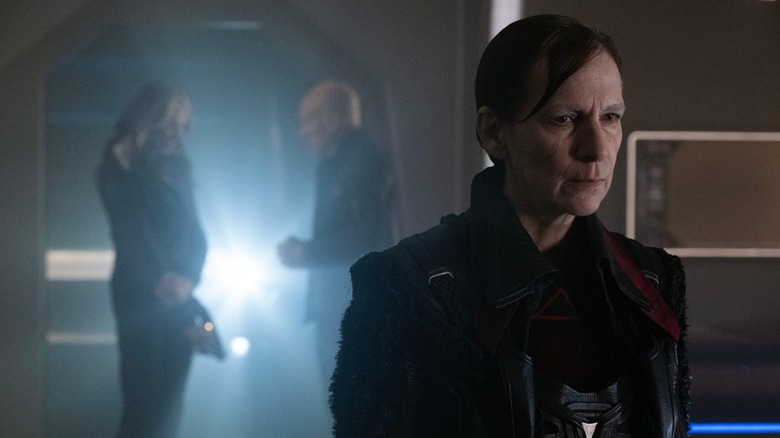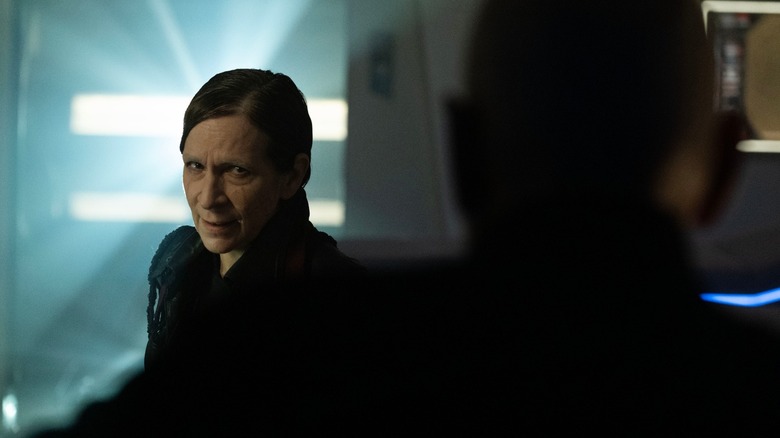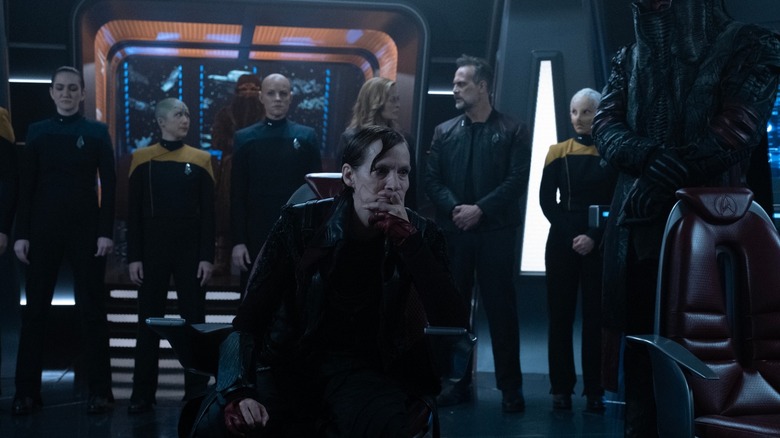Picard Season 3's Biggest Abandoned Plotline Is The Kind Of Thing That Can Drive A Star Trek Fan Crazy
This post contains spoilers for "Star Trek: Picard."
In "Avengers: Endgame," the genocidal space alien Thanos (Josh Brolin) seeks six magical Infinity Stones that, when united, will grant him whatever wish he wants. Thanos, however, is a lifelong soldier and military commander, so his wishes all tend toward mass killing. Thanos, long ago, noticed that the galaxy was grievously overpopulated and that resources were eternally misallocated, leading to starvation and suffering. If the universe's population were suddenly cut in half, he figures, then all living beings would once again thrive and be well-fed and happy. He also argues that the shared mourning over an act of mass death would cause the survivors to bond in peace.
Thanos' means are monstrous, of course, but his grievance is legitimate. There does seem to be too little space to house the universe's ever-growing population, and resources are still dwindling. Thanos' greatest fault is that he's uncreative. Rather than think of a humane, non-genocidal way to solve these problems, he resorts to mass murder.
One of the most frustrating things about "Avengers: Endgame," however, is that after dozens of superheroes have fought Thanos on a battlefield and executed him in public, they don't ever once stop to address his legitimate concerns. One might think that starvation and overpopulation would be a problem superheroes might want to solve, just in a cleverer and more humane way than Thanos suggested. Even after the heroes win, Thanos' issues remain.
In the most recent season of "Star Trek: Picard," the villain Vadic (Amanda Plummer) has a similarly legitimate grievance. She, a wrathful Changeling, seeks revenge after the Federation tortured and mistreated her people during a war several decades ago. Like Thanos, she is defeated. Also like Thanos, once she's killed, no one addresses her issues.
This is a problem. It lets Starfleet off the hook.
Vadic's grievances
When she first appeared on "Picard," Vadic was mysterious, violent, and cruel. She piloted a ship called the Shrike, and was perfectly willing to wipe out whatever vessel stood in the path of her quest to apprehend one Jack Crusher (Ed Speleers). For the show's first eight episodes, Vadic served as the central villain, cackling with sadistic glee, smoking cigarettes, and consorting with a mysterious overling. She looked a little bit like a Nazi doctor, what with her forward-combed hair and black gloves.
It turns out there was a reason she looked that way. When Vadic invaded the U.S.S. Titan-A and confronted Jean-Luc Picard (Patrick Stewart), she revealed that she and several other Changelings had been kidnapped by the Federation during an infamous war (dramatized at length on "Star Trek: Deep Space Nine"). She and the other Changelings were tortured and experimented on in secret by a Federation scientist ... also played by Amanda Plummer. Vadic, then, adopted the face of her torturer and set about on a quest for revenge. She was enraged that Starfleet committed a war crime and was then let off the hook. Her ultimate goal is to destroy as much of the Federation as possible.
Vadic's story reveals something gross and dark about Starfleet: evidently, Gene Roddenberry's idealistic future organization — one devoted to peace and diplomacy — was corrupted by war and employed torture doctors. Starfleet, then, unwittingly created a terrorist faction keen on apocalyptic revenge. Oops.
Vadic, who killed many people on "Picard," was eventually bested when Seven of Nine (Jeri Ryan) blew her out of an airlock. She died in the vacuum of space. That was in episode eight of 10.
One might think the final two episodes would involve a reckoning by Picard.
They aren't.
The Borg misdirect
"Picard" raised a legitimate issue with Vadic. Is Starfleet now the kind of organization that secretly conducted torturous medical experiments on kidnapped prisoners of war? It seems that they are. Had "Picard" been more thoughtful, it might have seen an episode — or indeed a climax — where Picard and the cast of "Star Trek: The Next Generation" travel to Starfleet headquarters and call out the organization for its malfeasance, war crimes, and secrecy. Picard might even demand that reparations be paid. Two episodes of Picard fighting for what's right in this scenario would have been legitimately exhilarating.
Instead, the Changeling plot is abandoned for a (frankly quite ridiculous) plot twist involving the Borg. It seems the Changelings had been in cahoots with a secret Borg enclave somehow, and passed on all "destruction of the Federation" duties to them. The plot involved a secret Borg gene embedded in Picard's brain, and a starship attack reminiscent of "Return of the Jedi." Everything ended with a big battle, lots of firing weapons, and thrilling action.
But it matters not how thrilling the action is if Vadic's actual issues were never addressed. This is "Star Trek," a franchise that is usually careful to study ethical issues and studiously avoids war. This is not "Star Wars," a world of "good guys" and "bad guys." This is a world of pacifists, ethics, and complex moral structures. "Picard" brought up an actual war crime ... and then just dropped it. Even the stirringly moral Dr. Crusher (Gates McFadden) doesn't want to pursue the fact that the Federation behaved unethically toward the Changelings.
If Picard ever did confront Starfleet about their war crimes, it never appeared on the screen. It will have to remain, sadly, a mere piece of headcanon.


